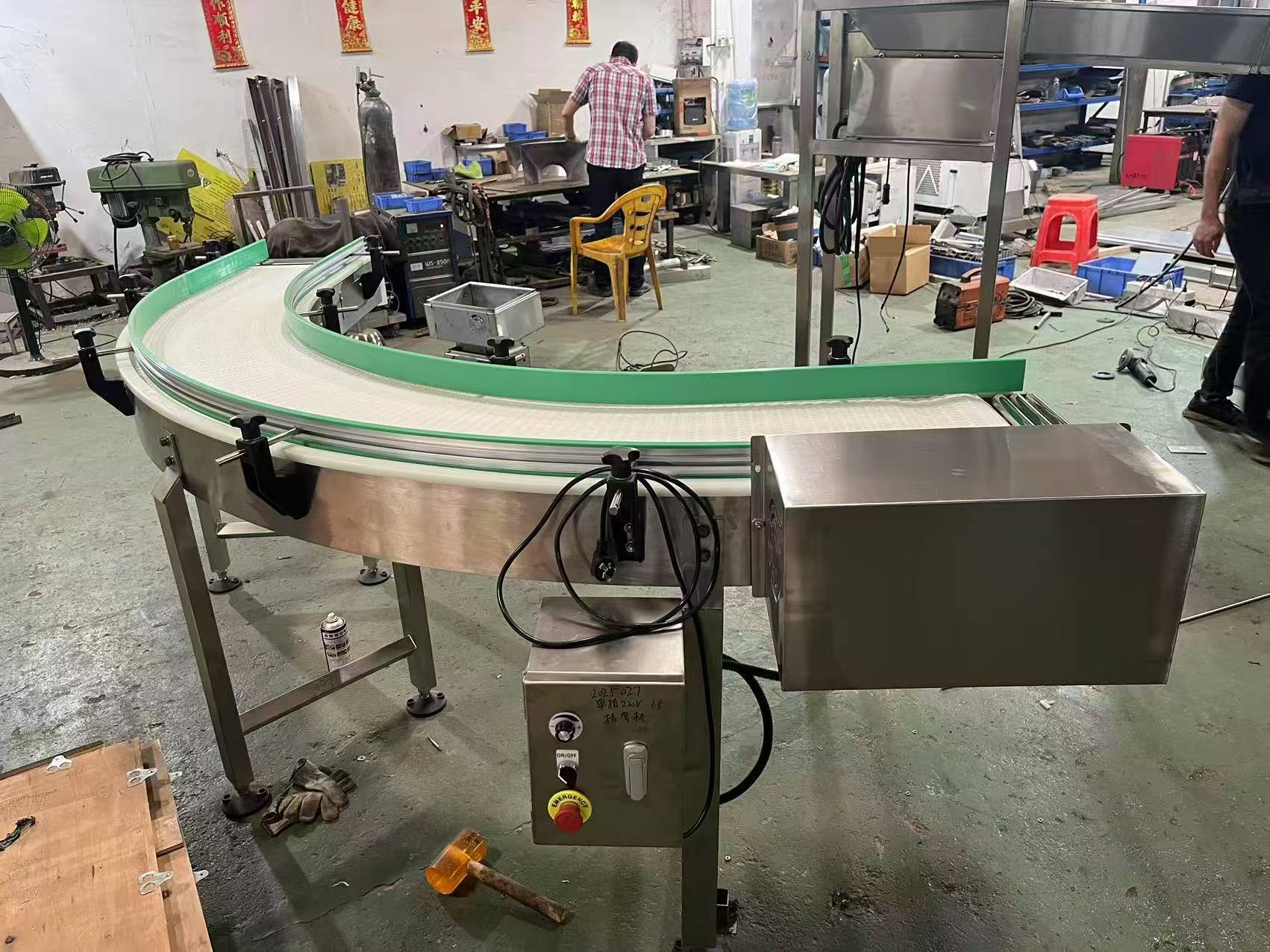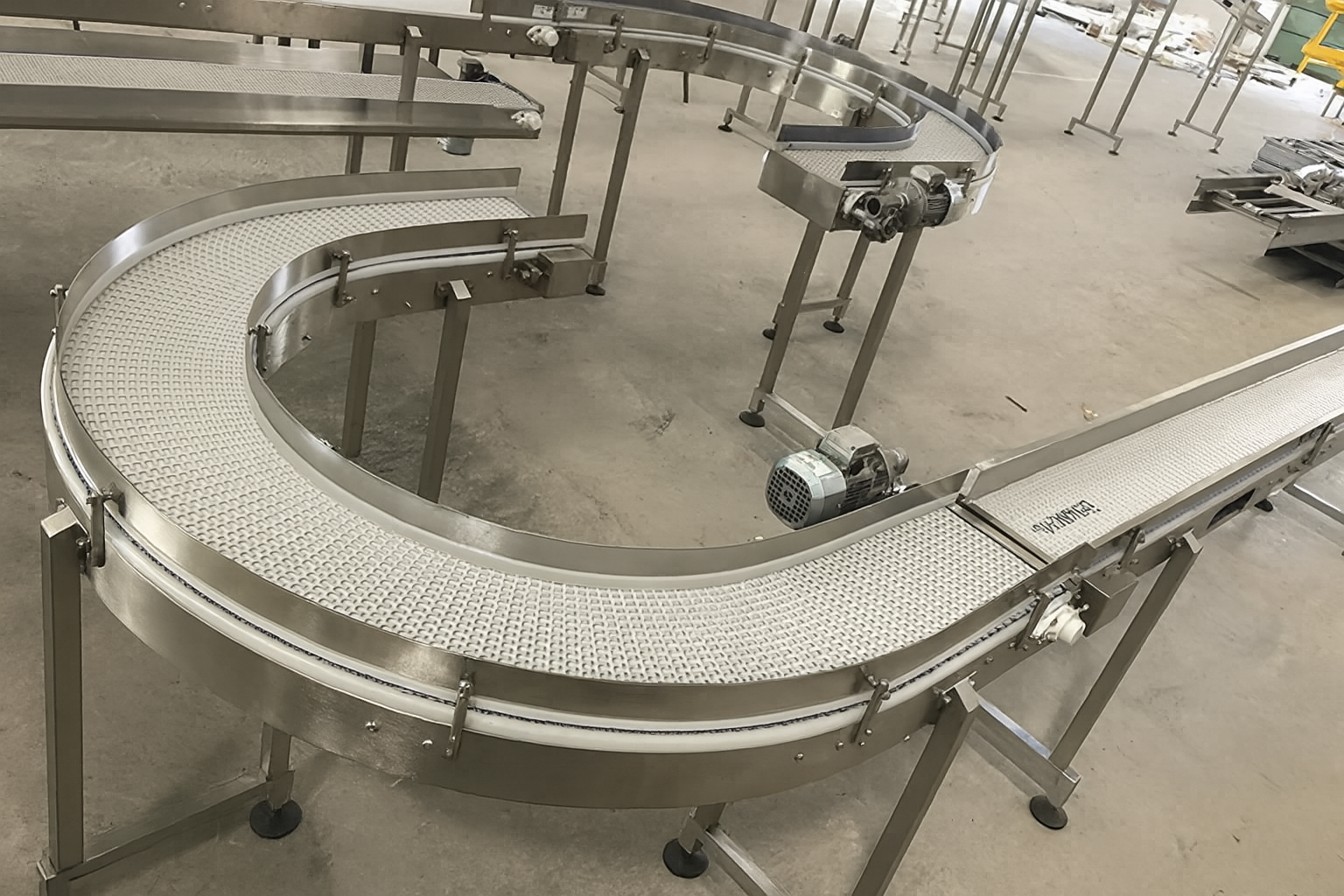Введение
На современном быстро меняющемся потребительском рынке важность автоматизации упаковки продуктов питания невозможно переоценить. Эффективная упаковка влияет на внешний вид продукта, продлевает срок его годности, повышает безопасность пищевых продуктов и повышает эффективность производства. В основе каждой автоматизированной упаковочной линии лежат системы конвейеров для пищевых продуктов— важнейшие компоненты, обеспечивающие бесперебойную работу всех этапов производства. Производительность этих конвейеров напрямую влияет на гигиену, эффективность работы и гибкость.
Традиционные системы конвейеров для пищевых продуктов, такие как ленточные, цепные и роликовые конвейеры, десятилетиями доминировали в отрасли благодаря отработанной технологии и меньшим первоначальным инвестициям. Однако, по мере того, как потребительские предпочтения смещаются в сторону повышения безопасности пищевых продуктов, расширения ассортимента продукции и более интеллектуальных методов производства, соответствующих принципам Индустрии 4.0, эти традиционные конвейеры сталкиваются со значительными ограничениями.
Модульные конвейеры для пищевых продуктов, находящиеся на переднем крае современных инноваций, стали эффективной альтернативой. Благодаря непревзойденной гибкости и гигиеничности, модульные конвейеры побуждают лидеров отрасли и производителей пищевых конвейеров пересмотреть традиционные решения. В данной статье рассматриваются оба типа конвейеров, подчеркиваются преимущества модульных пищевых конвейеров и рассматривается концепция FILL PACKAGE в области автоматизации упаковки пищевых продуктов нового поколения.
Традиционные системы конвейерной транспортировки пищевых продуктов: преимущества и недостатки
На протяжении десятилетий традиционные конвейеры обеспечивали быстрый рост производства продуктов питания, обладая очевидными преимуществами:
- Более низкие первоначальные инвестиции
- Установленная надежность
- Простота эксплуатации и обслуживания
Однако по мере ужесточения гигиенических стандартов и роста спроса на гибкое производство недостатки традиционных конвейеров становятся все более очевидными:
- Гигиенические риски: Традиционные системы, особенно сложные ленточные конвейеры, часто задерживают остатки пищи и влагу, создавая риск загрязнения. Эта проблема особенно остро стоит на линиях переработки мяса и морепродуктов.
- Высокие затраты на техническое обслуживание: Регулярные проверки и частая замена деталей приводят к простоям производства, увеличивая эксплуатационные расходы.
- Ограниченная гибкость: Фиксированная компоновка препятствует быстрой адаптации к новым продуктам или форматам упаковки, снижая конкурентоспособность на современном быстро меняющемся рынке.
- Неэффективность использования пространства: Традиционные конвейеры часто требуют значительной площади, что ограничивает их пригодность для компактных, эффективных сред.
- Проблемы эффективности: Высокоскоростные операции могут привести к застреванию продукции и ее повреждению, что снижает пропускную способность и производительность.

Модульные системы конвейеров для пищевых продуктов: современные решения для сегодняшних задач
В ответ на эти ограничения модульные конвейерные системы для пищевых продуктов быстро завоевали популярность. Созданные из стандартизированных, но при этом настраиваемых модулей, модульные конвейеры обладают значительными преимуществами:
- Улучшенная гигиена: Модульные ленты можно быстро разобрать для тщательной очистки и дезинфекции, что значительно снижает риск заражения.
- Большая гибкость и адаптивность: Модульные конструкции легко адаптируются к новым производственным потокам, типам продукции и размерам упаковки, идеально поддерживая разнообразное мелкосерийное производство.
- Повышенная эффективность и производительность: Модульные конвейеры обеспечивают стабильную и точную транспортировку продукции на более высоких рабочих скоростях, сводя к минимуму простои из-за заторов или повреждений.
- Тихая и безопасная работа: Модульные конвейеры, разработанные для обеспечения безопасности оператора и снижения шумового загрязнения, повышают комфорт на рабочем месте.
- Более низкая общая стоимость владения (TCO): Несмотря на более высокие первоначальные инвестиции, модульные конвейеры обеспечивают долгосрочную экономию за счет сокращения затрат на техническое обслуживание, энергоэффективности и минимизации простоев.

Видение FILL PACKAGE: Развитие автоматизации упаковки пищевых продуктов
FILL PACKAGE, ведущий производитель конвейеров для пищевой промышленности, продвигает модульную конвейерную технологию, интегрированную с передовой автоматизацией упаковки пищевых продуктов. Наше видение упаковочных линий будущего сочетает в себе модульные конвейеры с интеллектуальными технологиями автоматизации, создающими высокоэффективные производственные экосистемы, управляемые данными.
Основные компоненты наших модульных конвейерных решений включают в себя:
- Точное наполнение: Современные системы взвешивания, включая многоголовочные весы, обеспечивают точность и сокращают отходы.
- Интеграция интеллектуальной упаковки: робототехника и системы машинного зрения на базе искусственного интеллекта, которые адаптируются к изменениям продукции, обнаруживают дефекты и поддерживают стабильное качество.
- Бесшовная модульная конвейерная система: Модульные конвейерные системы эффективно связывают критические этапы упаковки: от наполнения и герметизации до проверки и укладки на поддоны.
- Аналитика на основе данных: Технологии Интернета вещей и облачных вычислений позволяют осуществлять мониторинг в режиме реального времени и проводить профилактическое обслуживание, сводя к минимуму непредвиденные простои.
Внедрение модульных конвейерных систем от надежного производителя пищевых конвейеров, такого как FILL PACKAGE, обеспечивает оптимальную гигиену, эксплуатационную гибкость и полную интеграцию с принципами Индустрии 4.0.
Заключение: Модульные конвейеры Определите будущее автоматизации упаковки пищевых продуктов
Хотя традиционные конвейерные системы исторически хорошо зарекомендовали себя в отрасли, современные производственные условия требуют решений, соответствующих современным стандартам безопасности, требованиям гибкости и тенденциям автоматизации. Модульные конвейерные системы для пищевых продуктов идеально отвечают этим меняющимся требованиям, предлагая очевидные преимущества в плане гигиены, гибкости, интеллектуальной интеграции и долгосрочной экономии средств.
📩 Обеспечьте будущее вашей линии упаковки пищевых продуктов
Узнайте, как Индивидуальные системы конвейеров для пищевых продуктов FILL PACKAGE может помочь вам добиться более разумного, чистого и эффективного производства.
👉 Свяжитесь с нами сегодня для индивидуальных решений в области конвейеров и автоматизации, разработанных с учетом ваших потребностей!

